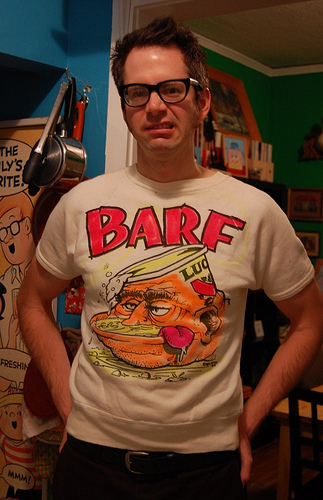 Originally published in Verbicide issue #22
Originally published in Verbicide issue #22
For the second time in his life, comic artist Johnny Ryan is selling out.
Related Posts
Well, sort of. After years of lampooning, criticizing, sexualizing, and degrading mainstream superheroes in his own small press comics, Ryan has joined up with Marvel Comics for its Marvel Underground series. Now, he gets to lampoon, criticize, sexualize, and degrade mainstream superheroes on a more legitimate platform.
“I used to read Marvel Comics as a kid, so it’s fun to revisit some of these characters,” Ryan explains. “Plus, it’s also kinda fun to do work that pays real money.”
It’s an odd professional arc for a man whose usual antics involve finding the most hilarious way to draw one character sodomizing another. Johnny started out self-publishing his flagship title, Angry Youth Comix, with the goal of becoming a professional artist. He finally succeeded when graphic novel publisher Fantagraphics signed him in 2001. Since then, Johnny has parlayed his iconic drawing style and industry connections into illustration jobs with Vice and Nickelodeon magazines. But that mainstream attention was bitterly ironic given his body of work. Google “Johnny Ryan” and you are very likely to find a comic with a man biting off another man’s dick, or a gag about a detective who rapes people. The jokes aimed at the Nickelodeon demographic are few and far between.
“I’ve done 9/11 jokes, ‘Islamic Terrorist Spring Break,’ the cover of Comic Book Holocaust #4, and some others here and there,” Johnny quips, adding, “For the most part, I don’t have any real interest in political humor.”
Still, don’t confuse his enthusiasm for taboo subject matter as the markings of a sociopath. Johnny is merely pushing the boundaries of bad taste in service of the guilty laugh. It’s a talent that comes very easily to him.
“I work instinctually,” he asserts. “If I come up with an idea that amuses me, then I follow it through. I try not to over-think stuff… I don’t usually think about whether or not I’m relevant. I draw these comics and hope for the best.”
The result is a collection of storylines and characters that are carefully crafted to be outlandishly vulgar and juvenile without making any attempt to contextualize or rationalize Johnny’s singular point of view. He concedes that much of his humor is “antagonistic,” but believes it is for the greater good. In a world where consciously contemplative graphic novels have become the norm, he wishes artists wouldn’t take themselves so seriously.
“Comics are desperately trying to be seen as a legitimate and serious art form and move away from its lowbrow, throwaway past. So, things like humor aren’t really welcome anymore. Unless it’s like that gentle NPR kind of humor.”
Championing such dark humor may be easier said than done. Controversial subject matter has always been an easy target for conservative mainstream media. Because of this, Johnny Ryan is in no hurry to make it big. In fact, he values the freedom that anonymity has provided. He knows full well that if he ever does sell out, his number might be up. Until then, he’ll continue to follow his instincts to push the boundaries of morality and political correctness in secret, contending, “As long as I stay in the underground comic biz, no one will notice me.”